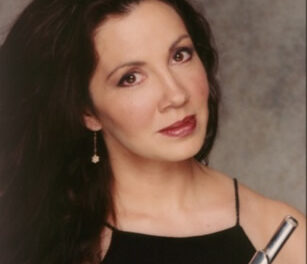Sonorous Road Repertory Company re-opened this season in its gorgeous new space nestled in the back of the old Royal Bakery building on Hillsborough Street. The small studio theater currently houses the wonderfully upsetting Dry Powder. Sarah Burgess’ 2016 play, described as a “gripping new dark comedy,” is sharply indicative of the way Corporate America holds the fate of the majority of jobs and lives in its well-manicured hand.
Set designer Vivian Chang had the stage set up in a disconcerting, symmetrical assemblage of versatile pieces that immediately felt harsh. Lighting designer Anthony Buckner continued this feeling throughout the play with harsh blue LED lights flooding the actors’ faces, as well as a Bansky-style graffito that is gradually revealed upstage with the creative use of projection. The play is a solid hour-and-forty-five minutes with no intermission, and the image was initially blacked out, until widening strips of it were revealed, adding to the constant feeling of suspense.
Seth (Chris Hinton) has set up a deal with Jeff (Alan Maule), the CEO of a luggage company, that will be a huge investment for his firm, allow Jeff the security of growth without layoffs for his people, and also help shake off some bad press that Seth’s firm has faced lately. The firm, headed up by president Rick (Dan Oliver) is under scrutiny for announcing massive layoffs in another company right before Rick’s lavish engagement party. Seth is pitching the deal to Rick when Seth’s adversary Jenny (Michelle Murray Wells), another partner at the firm, comes up with an alternate plan that will cause massive layoffs but huge profit for Rick. The corruption and scandal thicken constantly as these four warring executives try to determine the fate of Jeff over 600 employees.
The acting was enhanced with very purposeful blocking, bringing characters right in each other’s faces or, more powerfully, with their backs to each other. Wells, incidentally the founder and artistic director of Sonorous Road, did a great job of broadcasting Jenny’s feelings during the first meeting with Jeff, almost completely with her back to him. None of the characters was particularly lovable, but that seemed to be the point; resentment among the classes was palpably rife – as it is out here in the real world now.
Hinton and Wells played an engaging dynamic between Seth and Jenny. Since they are both partners at Rick’s private equity company, they have more or less the same goal – making money for the company – and a similar history of advanced numbers, high test scores, and cutthroat internships. However, that doesn’t by any means make them friends. Wells was ruthless in her biting wit, challenging Hinton at every turn, while Hinton casually brushed off her insults and quickly spat out his own. Their arguments were unlike the explosive fight scenes of most theatre, which stop the plot from moving forward. Instead, scene by scene, the characters were fleshed out, and we learned about their motivations and natures through their fighting. The lines were difficult to deliver, full of financial buzzwords, jargon, and clunky structure, but Wells and Hinton made their way through them as organically as they could, with only a few delivery issues.
While Wells and Oliver remained mercurial and subversive throughout the play, Hinton showed Seth’s growing unease with the position the deal was putting him in with his friend Jeff. Maule, likewise, showed Jeff at the start of the play as an altruistic California executive, in an ideological war with the New York company’s attitude. Characters almost always had their phones in hand, further underscoring the urgency of their actions as well as the immediate consequences those actions could have, though it was irritating to see the unfortunately accurate representation of conversation in the Digital Age: full of interruptions and disinterested nods as people were enthralled with their phones.
This hypothetical situation among high-powered moneymakers is stylized yet completely believable. While full of entertaining quips and funny remarks, it is also incredibly dark. The charged political climate of Trump-era America is the perfect setting for Dry Powder, and makes many statements about the nature of capitalism and free enterprise.
The show, definitely not for the faint of heart, and definitely not suitable for children due to some language and mention of sex, continues through Sunday, May 27. For more details about this production, please view the sidebar.













